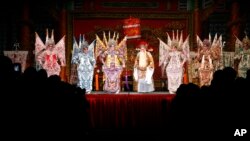Cantonese opera is an art form best known for elaborate make up, costumes and tales of long-dead heroes. But for four days this April, a Hong Kong theatre will take on a larger than life character from the modern day: U.S. President Donald Trump.
Hong Kong’s Sunbeam Theatre will stage a performance of Trump On Show, a three and a half hour comedic reimagining of the U.S. president’s life and that of his fictional twin brother who lives in China. The opera was written, directed and produced by Edward Li Kui-ming, a Feng shui master and film producer turned prolific playwright.
The upcoming production is a follow-up to Li’s successful and controversial Chairman Mao opera staged in 2016, which recounted three fictional romances of China’s most famous leader, Mao Zedong.
“After the success of Chairman Mao, it seems to me in recent years everybody in the whole world are indulged in the name Donald Trump. Everyday, we are talking about Trump, Trump, Trump,” Li said in an interview at his theatre. for which he donned traditional Chinese robes. “It inspired me: why aren’t we doing an opera related with Donald Trump?”
Li said his operas were not meant to be political commentary – rather works of “black comedy” – but both Chairman Mao and Trump on Show touch on some of the most controversial topics in Chinese 20th century history, including the Cultural Revolution and Mao’s tenure as leader of China.
It also does not shy away from lampooning famous leaders like Zhou Enlai, Jiang Qing, who was better known as “Madame Mao,” and the infamous chairman himself. Many of the characters from Chairman Mao will reappear in the Trump opera and in a wink to the audience, lead actor Loong Koon-tin will play both Mao as well as Trump.
Li plans to complete the trilogy next year with a production about the Gang of Four, a powerful faction led by Madame Mao that dominated Chinese politics during the 1960s and 1970s.
Such a light-hearted and humorous look at Chinese history is almost unthinkable in mainland China today, which resumed sovereignty of the former British colony in 1997. Hong Kong has more freedoms than China until 2047 under the "one country, two systems" model, although many residents and political leaders fear where the city will head when that period expires.
Hong Kong’s identity crisis, however, helped to renew interest in Cantonese opera in the the 1990s after a 30 year decline, according to renowned Cantonese opera scholar Chan Sau-yan. Today the industry is heavily supported by the Hong Kong government, which opened the $346 million Xiqu Centre in January to host performances.
While most Cantonese operas staged in Hong Kong follow traditional themes, Li’s productions are not the first to comment on political issues or veer away from tales of gods and antiquity.
“When Chinese opera first evolved in the 11th century, it was a social commentary exposing the misdemeanors of the literati and the officials,” Chan said. “My theory is Chinese opera has long been a form for the common people for the underrepresented people but then of course later in the Qing dynasty it has been turned into a royal form of art patronized by the royal families.”
During the 1930s, another tumultuous era in Chinese history, a number of Cantonese operas staged in Hong Kong and southern China featured contemporary settings and political themes, he said.
For as much as it may poke fun at contemporary geopolitics, Trump on Show, however, has another agenda, according to Li. The opera will contain many lessons for the controversial U.S. president and includes a cathartic scene in which North Korean leader Kim Jong-un makes Trump a cheeseburger in the White House kitchen.
“In this opera we try to make everybody understand unity is the best way, love is the best way to solve all the best problems,” Li said.
He hopes as well that he can one day stage the performance for the U.S. president in Washington.
Trump on Show runs from April 12 to 15 at the Sunbeam Theatre in Hong Kong.





